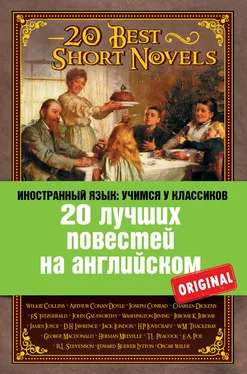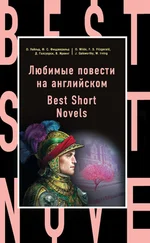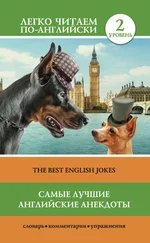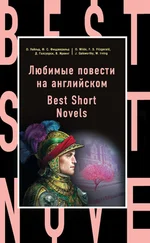It was but for a moment that I remained undecided whether or not to follow my servant; pride and curiosity alike forbade so dastardly a flight. I re-entered my room, closing the door after me, and proceeded cautiously into the interior chamber. I encountered nothing to justify my servant’s terror. I again carefully examined the walls, to see if there were any concealed door. I could find no trace of one, – not even a seam in the dull-brown paper with which the room was hung. How, then, had the THING, whatever it was, which had so scared him, obtained ingress except through my own chamber?
I returned to my room, shut and locked the door that opened upon the interior one, and stood on the hearth, expectant and prepared. I now perceived that the dog had slunk into an angle of the wall, and was pressing himself close against it, as if literally striving to force his way into it. I approached the animal and spoke to it; the poor brute was evidently beside itself with terror. It showed all its teeth, the slaver dropping from its jaws, and would certainly have bitten me if I had touched it. It did not seem to recognize me. Whoever has seen at the Zoological Gardens a rabbit, fascinated by a serpent, cowering in a corner, may form some idea of the anguish which the dog exhibited. Finding all efforts to soothe the animal in vain, and fearing that his bite might be as venomous in that state as in the madness of hydrophobia [11], I left him alone, placed my weapons on the table beside the fire, seated myself, and recommenced my Macaulay.
Perhaps, in order not to appear seeking credit for a courage, or rather a coolness, which the reader may conceive I exaggerate, I may be pardoned if I pause to indulge in one or two egotistical remarks.
As I hold presence of mind, or what is called courage, to be precisely proportioned to familiarity with the circumstances that lead to it, so I should say that I had been long sufficiently familiar with all experiments that appertain to the marvellous. I had witnessed many very extraordinary phenomena in various parts of the world, – phenomena that would be either totally disbelieved if I stated them, or ascribed to supernatural agencies. Now, my theory is that the supernatural is the impossible, and that what is called supernatural is only a something in the laws of Nature of which we have been hitherto ignorant. Therefore, if a ghost rise before me, I have not the right to say, ‘So, then, the supernatural is possible;’ but rather, ‘So, then, the apparition of a ghost, is, contrary to received opinion, within the laws of Nature, – that is, not supernatural.’
Now, in all that I had hitherto witnessed, and indeed in all the wonders which the amateurs of mystery in our age record as facts, a material living agency is always required. On the Continent you will find still magicians who assert that they can raise spirits. Assume for the moment that they assert truly, still the living material form of the magician is present; and he is the material agency by which, from some constitutional peculiarities, certain strange phenomena are represented to your natural senses.
Accept, again, as truthful, the tales of spirit-manifestation in America, – musical or other sounds; writings on paper, produced by no discernible hand; articles of furniture moved without apparent human agency; or the actual sight and touch of hands, to which no bodies seem to belong, – still there must be found the MEDIUM [12], or living being, with constitutional peculiarities capable of obtaining these signs. In fine, in all such marvels, supposing even that there is no imposture, there must be a human being like ourselves by whom, or through whom, the effects presented to human beings are produced. It is so with the now familiar phenomena of mesmerism [13]or electro-biology; the mind of the person operated on is affected through a material living agent. Nor, supposing it true that a mesmerized [14]patient can respond to the will or passes of a mesmerizer [15]a hundred miles distant, is the response less occasioned by a material being; it may be through a material fluid – call it Electric, call it Odic, call it what you will – which has the power of traversing space and passing obstacles, that the material effect is communicated from one to the other. Hence, all that I had hitherto witnessed, or expected to witness, in this strange house, I believed to be occasioned through some agency or medium as mortal as myself; and this idea necessarily prevented the awe with which those who regard as supernatural things that are not within the ordinary operations of Nature, might have been impressed by the adventures of that memorable night.
As, then, it was my conjecture that all that was presented, or would be presented to my senses, must originate in some human being gifted by constitution with the power so to present them, and having some motive so to do, I felt an interest in my theory which, in its way, was rather philosophical than superstitious. And I can sincerely say that I was in as tranquil a temper for observation as any practical experimentalist could be in awaiting the effects of some rare, though perhaps perilous, chemical combination. Of course, the more I kept my mind detached from fancy, the more the temper fitted for observation would be obtained; and I therefore riveted eye and thought on the strong daylight sense in the page of my Macaulay.
I now became aware that something interposed between the page and the light, – the page was over-shadowed. I looked up, and I saw what I shall find it very difficult, perhaps impossible, to describe.
It was a Darkness shaping itself forth from the air in very undefined outline. I cannot say it was of a human form, and yet it had more resemblance to a human form, or rather shadow, than to anything else. As it stood, wholly apart and distinct from the air and the light around it, its dimensions seemed gigantic, the summit nearly touching the ceiling. While I gazed, a feeling of intense cold seized me. An iceberg before me could not more have chilled me; nor could the cold of an iceberg have been more purely physical. I feel convinced that it was not the cold caused by fear. As I continued to gaze, I thought – but this I cannot say with precision – that I distinguished two eyes looking down on me from the height. One moment I fancied that I distinguished them clearly, the next they seemed gone; but still two rays of a pale-blue light frequently shot through the darkness, as from the height on which I half believed, half doubted, that I had encountered the eyes.
I strove to speak, – my voice utterly failed me; I could only think to myself, ‘Is this fear? It is not fear!’ I strove to rise, – in vain; I felt as if weighed down by an irresistible force. Indeed, my impression was that of an immense and overwhelming Power opposed to my volition, – that sense of utter inadequacy to cope with a force beyond man’s, which one may feel physically in a storm at sea, in a conflagration, or when confronting some terrible wild beast, or rather, perhaps, the shark of the ocean, I felt morally . Opposed to my will was another will, as far superior to its strength as storm, fire, and shark are superior in material force to the force of man.
And now, as this impression grew on me, – now came, at last, horror, horror to a degree that no words can convey. Still I retained pride, if not courage; and in my own mind I said, ‘This is horror, but it is not fear; unless I fear I cannot be harmed; my reason rejects this thing; it is an illusion, – I do not fear.’ With a violent effort I succeeded at last in stretching out my hand towards the weapon on the table; as I did so, on the arm and shoulder I received a strange shock, and my arm fell to my side powerless. And now, to add to my horror, the light began slowly to wane from the candles, – they were not, as it were, extinguished, but their flame seemed very gradually withdrawn; it was the same with the fire, – the light was extracted from the fuel; in a few minutes the room was in utter darkness. The dread that came over me, to be thus in the dark with that dark Thing, whose power was so intensely felt, brought a reaction of nerve. In fact, terror had reached that climax, that either my senses must have deserted me, or I must have burst through the spell. I did burst through it. I found voice, though the voice was a shriek. I remember that I broke forth with words like these, ‘I do not fear, my soul does not fear;’ and at the same time I found strength to rise. Still in that profound gloom I rushed to one of the windows; tore aside the curtain; flung open the shutters; my first thought was – LIGHT. And when I saw the moon high, clear, and calm, I felt a joy that almost compensated for the previous terror. There was the moon, there was also the light from the gas-lamps in the deserted slumberous street. I turned to look back into the room; the moon penetrated its shadow very palely and partially, – but still there was light. The dark Thing, whatever it might be, was gone, – except that I could yet see a dim shadow, which seemed the shadow of that shade, against the opposite wall.
Читать дальше
Конец ознакомительного отрывка
Купить книгу












